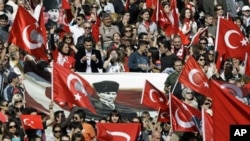Can the burgeoning democracies in Egypt and Tunisia learn from Turkey’s legacy of having a decades-old functioning democratic system? If you ask politicos around Washington D.C., the answer is yes… and no. Robert Kaplan, a senior fellow at the Center for a New American Security, argues yes. This week, he wrote in the Washington Post that “Turkey is an exemplar of Islamic democracy that can serve as a role model for these newly liberated states, especially as its democracy evolved from a hybrid regime - with generals and politicians sharing power until recently.”
However, other experts on Turkish politics are skeptical it would work in the Arab world. This week, the Brookings Institution - a Washington think tank - convened a panel called “Turkey as an Alternative Democratization Model for the Middle East.” The panelists discussed a so-called “Turkey model” but urged caution when making generalizations about applying Turkey’s lessons to morphing countries like Libya, Egypt and Tunisia.
Since its founding in 1923 from the remnants of the Islamic Ottoman Empire decimated during World War I, Turkey’s founding fathers and their dynamic leader, Mustafa Kemal Ataturk, strongly rejected Turkey’s Islamic roots. Ataturk founded a staunchly secular, democratic state which relied upon a strong military to guarantee stability.
Subsequently, Turkey endured three coup d’etats in 1960, 1971 and 1980 and ousted former Prime Minister Necmettin Erbakan in 1997. So Turkey’s status of a continuous democracy since its founding is a matter of interpretation. Today, the military answers to the National Security Council which is subordinate to the office of the prime minister.
Yet, throughout its modern history, Turkey remained a majority Muslim country where conservative and moderate Muslims could participate in the political process, although official Islamic parties were often banned citing constitutional secularism.
But in recent times, moderate Islamic sentiment has led to the ascendance of the Justice and Development Party (AKP) through parliamentary elections and an absolute majority since 2002. The AKP exhibits traits of a reverence for Islam, pluralistic democracy and pro-business capitalism.
At the panel in Washington, Semih Idiz, a columnist for the Milliyet newspaper in Istanbul, said he defines the Turkish model as a primarily Western approach that just happened to mesh well with Turkey’s Muslim population.
“When I talk about the Turkish model I am referring to a Western template: one that is based on parliamentary democracy, secularism,” says Idiz. “It was adopted from the West and was implemented and filled in with Turkey’s own realities. So here is a country with a 99 percent Muslim population that is implementing a Western template, showing that factors that are considered to be dichotomous do not have to be so. I am referring to the fact that Turkey has an Islamic society and is able to maintain a democracy.”
However, Henri Barkey - a professor of International Relations at Lehigh University and a visiting scholar at the Carnegie Endowment for International Peace says applying the “Turkey model” to Arab countries is not realistic.
“Turkey as an end state model – sure, who in the region wouldn’t want to be where Turkey is today,” says Barkey. “It is the 16th largest economy in the world, it has a resilient society, it is a democracy with contested elections, and it is now a country of consequence. So in all these respects, as an end state, Turkey is something one would like to emulate. However the devil is in the process. If you are Egypt, how do you get from where you are today to where Turkey is today? And that’s where I find the question of a model to be problematic.”
Barkey argues that if the Arab countries began implementing what Turkey did in the 1980s today - namely economic and political reforms - it would still take 30 years for those countries to emerge to a democratic standard that the world would recognize and accept. He says that in the search for models for the Middle East, one should look at Indonesia or Latin American countries - especially Argentina - for examples of more rapid transitions to democratic rule.
The panel also brought up the question as to whether the traditional role of the armed forces as a guarantor of a secular democratic political system could be applied - or even should be applied to countries like Egypt, where the military is acting for the moment as a stabilizing force during political upheaval.
Steven Cook is a Senior Fellow for Middle Eastern Studies at the Council on Foreign Relations. He points out that the military in Egypt, for example, is closely associated with the regime of ousted President Hosni Mubarak and his predecessors. He also questions the wisdom in encouraging a model like Turkey where the military has a dominant role in creating and defending the political system. He suggests genuine democracy akin to Western models are more desirable.
“If we want to promote democracy in Egypt, we should promote democracy, not some authoritarian solution to current instability and hope that the officers are ultimately democrats, despite themselves. I don’t think that that is a dynamic we are likely to see,” says Cook.
In a recent interview, Turkish Prime Minister Recep Tayyip Erdogan suggested that Turkey might best serve as an inspirational focal point for Arab countries instead of an exact blueprint. He said that Turkey’s history proves that secularism, moderate Islam and democracy can co-exist in a vibrant political system.
Can Arab States Mimic Turkey’s Blend of Islam and Democracy?




